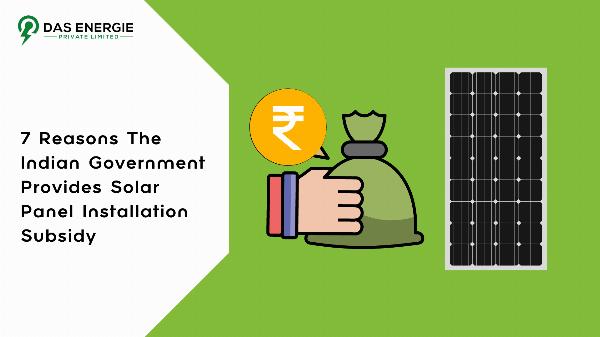7 Reasons Indian Government Provides Solar Panel Installation Subsidy

Strong 8k brings an ultra-HD IPTV experience to your living room and your pocket.
This article was originally posted on sociomix.com. Read the original article here.
The Indian Government is providing a solar panel installation subsidy of up to Rs. 78,000 under the PM Surya Ghar Muft Bijli Yojana to 1 Crore households in 2024. This subsidy scheme is boosting home rooftop solar system installation in Indian households. Here are the reasons for the government’s solar subsidy initiatives for you.
Why Does The Central Government of India Provide Solar Subsidy in 2024?
The reasons why the Indian Government is providing solar panel installation subsidy in 2024 are as follows:
1) Reduce electricity bills
The average cost of per unit thermal grid electricity is Rs. 8 in India in 2024. Home solar panel installation can help households reduce their electricity bills by generating solar-powered electricity.
A 3 kW solar panel can generate around 12-15 units of electricity per day. In a month, it can generate around 360-450 units of electricity. As a result, a homeowner in India can reduce grid dependence by reducing electricity imports. Thus, the electricity bill amount per month would decrease for the homeowner significantly with an increase in home rooftop solar system installation at a subsidised cost. Alongside this, you may also like to know about the 3 kW solar system installation cost.
2) Meet Renewable energy targets
India aims to install 500 GW of renewable energy by 2030 to reduce its carbon emissions by 50%. This would help the nation achieve net zero carbon emissions by 2070. Further, the nation aims to install 100 GW of solar energy as a part of the renewable energy targets by 2026 (as per the report of NDTV).
The home rooftop solar panel installation target of the nation is 40 GW by 2030. To achieve this target, the Indian government is boosting home solar system installation with subsidies. The home solar panel installation subsidy is Rs. 30,000, Rs. 60,000 and Rs. 78,000 for 1 kW, 2 kW and 3 kW or more capacities of solar panels.
3) Increase job opportunities
According to a CMIE report, the rate of unemployment in India has increased to 8.1% as of April 2024. The Indian Government is promoting home solar panel installation to increase job opportunities in the country. Increased job opportunities will reduce the unemployment rate in the nation facilitating economic growth.
Solar equipment such as panels, inverters and other products would increase the demand for workers in the manufacturing departments. Further, the installation services of solar systems require experienced professionals with expertise. As a result, boosting solar panel installation subsidies will lead to increased job opportunities and demand for home solar systems within the nation.
4) Reduce imports of solar panels and cells
The provision for subsidy on installing solar energy at home will increase the demand for solar products like solar panels, inverters, solar cells and other equipment. You can get a solar subsidy by installing DCR-marked or Indian-manufactured solar panels and cells. As a result, the solar subsidy scheme will increase the demand for domestic manufacturing of solar cells and solar panels in India.
This will ensure a boost in the Indian economy with increased sales of DCR solar panels. Further, the sale of DCR solar modules will significantly boost economic growth for India.
5) Environmental Protection
A solar panel installation subsidy will boost the number of home solar panel installations in Indian homes. Solar energy is a clean energy that is environment-friendly. As a result, a solar transition will inevitably lead to environmental protection by preventing the depletion of natural and non-renewable resources.
In addition, a solar transition will help converse non-renewable energy resources that are scarce for future generations. Thus, a solar subsidy will not only help in environmental protection but also facilitate environmental and social sustainability.
6) Load Management
The solar panel installation subsidy scheme has been launched by the Indian Government for load management in utility grids. Thermal power has a high demand due to the constant increase in the Indian population. A solar transition would as a result reduce the load on the thermal power-driven grid.
To help the government reduce the load on the grid, you can install an on-grid solar panel system. If you are looking for the best solar installer for your project, you can take the help of the platform of Das Energie Private Limited. The platform provides multiple free solar quotations for vendor selection for your home rooftop solar panel installation.
7) Energy Independence
Fossil fuels have a high demand across the nation to produce electricity. As a result, the burden on non-renewable energy like fossil fuels is high. Further, non-renewable energy resources cannot be replenished leading to their depletion. To make the country energy-independent, the central government is boosting solar panel installation subsidies.
The Indian Government is providing solar panel installation subsidies to promote Indian-manufactured solar panels and solar cells and increase the rate of solar adoption in the residential sector. This will also reduce imports and generate employment opportunities for workers in the nation to facilitate economic growth.
Note: IndiBlogHub features both user-submitted and editorial content. We do not verify third-party contributions. Read our Disclaimer and Privacy Policyfor details.


